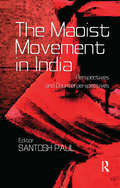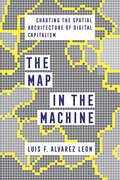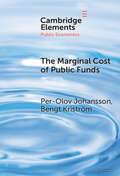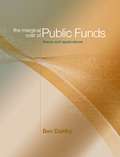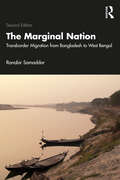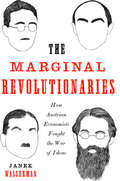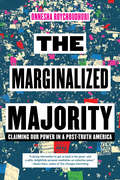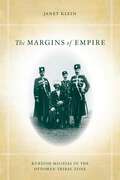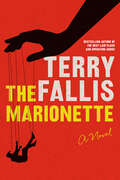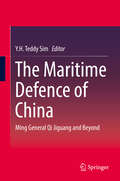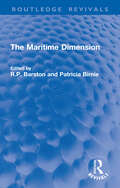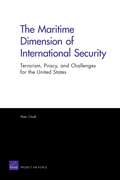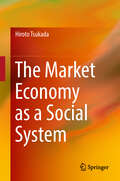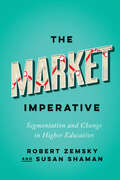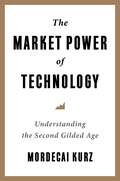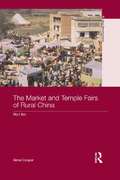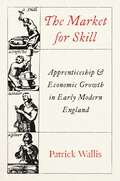- Table View
- List View
The Maoist Movement in India: Perspectives and Counterperspectives
by Santosh PaulThis book presents the raging debate on one of the most brutal political realities that India has confronted in recent years: the rising conflict between Maoist insurgent groups and the Indian State. With some of the finest writings on the subject, it brings together articles and interviews from leading authors, politicians, journalists, intellectuals, filmmakers and legal practitioners. The volume straddles between two apparently irreconcilable perspectives: (a) the view that the Maoist movement threatens the very core of democratic foundations, and should be perceived as a violent law & order situation justifying severe retaliatory measures, and (b) the counterview where Maoists are fiercely defended as revolutionaries and comrades of resistance, and the movement seen as the last-ditch struggle by those who have been abandoned over years by the State in its developmental process. The essays probe whether armed struggle is avoidable, whether the desperate desire for peace has simply been overtaken by political ideologies, and whether an inclusive developmental State policy may help restore faith in its democratic ethos. The book will be of interest to academics and students of politics, sociology, social anthropology and law. It will also be extremely useful to social workers, policymakers, politicians, bureaucrats, as well as the general reader.
The Map in the Machine: Charting the Spatial Architecture of Digital Capitalism
by Luis F. Alvarez LeonDigital technologies have changed how we shop, work, play, and communicate, reshaping our societies and economies. To understand digital capitalism, we need to grasp how advances in geospatial technologies underpin the construction, operation, and refinement of markets for digital goods and services. In The Map in the Machine, Luis F. Alvarez Leon examines these advances, from MapQuest and Google Maps to the rise of IP geolocation, ridesharing, and a new Earth Observation satellite ecosystem. He develops a geographical theory of digital capitalism centered on the processes of location, valuation, and marketization to provide a new vantage point from which to better understand, and intervene in, the dominant techno-economic paradigm of our time. By centering the spatiality of digital capitalism, Alvarez Leon shows how this system is the product not of seemingly intangible information clouds but rather of a vast array of technologies, practices, and infrastructures deeply rooted in place, mediated by geography, and open to contestation and change.
The Maps of Memory: Return to Butterfly Hill (The Butterfly Hill Series)
by Marjorie AgosinIn this inspiring sequel to the Pura Belpré Award–winning, &“dazzling and insightful&” (BCCB) I Lived on Butterfly Hill, thirteen-year-old Celeste Marconi returns home to a very different Chile and makes it her mission to rebuild her community, and find those who are still missing.During Celeste Marconi&’s time in Maine, thoughts of the brightly colored cafes and salty air of Valparaíso, Chile, carried her through difficult, homesick days. Now, she&’s finally returned home to find the dictatorship has left its mark on her once beautiful and vibrant community. Celeste is determined to help her beloved Butterfly Hill get back to the way it was and to encourage her neighbors to fight to regain what they&’ve lost. More than anything, Celeste wishes she could bring back her best friend, Lucilla, who was one of many to disappear during the dictatorship. Celeste tries to piece together what happened, but it all seems too big to fix—until she receives a letter that changes everything. When Celeste sets off on her biggest adventure yet, she&’ll uncover more heartbreaking truths of what her country has endured. But every small victory makes a difference, and even if Butterfly Hill can never be what it was, moving forward and healing can make it something even better.
The Marauders: Standing Up to Vigilantes in the American Borderlands
by Patrick Strickland&“The Marauders is a blistering book, a hard-ass stare into the voracious mouth of the US-Mexico border. Patrick Strickland has done a fine piece of reporting from places we don&’t dare to tread.&” — Luis Alberto Urrea, author of The Devil's Highway This real-life Western tells the story of how citizens in a small Arizona border town stood up to anti-immigrant militias and vigilantes. The Marauders uncovers the riveting nonfiction saga of far-right militias terrorizing the border towns of southern Arizona. In one of the towns profiled, Arivaca, rogue militia members killed a man and his nine-year-old daughter in 2009. In response, the residents organized and spent two years trying to push the new militias out through boycotts and by urging local businesses to ban them. The militias and vigilante groups again raised the stakes, spreading Pizzagate-style conspiracy theories alleging that town residents were complicit in child sex trafficking, prompting fears of vigilante violence. The Marauders flips the standard formula most often applied to stories about immigration and the far right. Too often those stories are told from the perspective of the ones committing the violence. While Strickland doesn't shy away from exploring those dark themes, the far right are not the protagonists of the book. Rather, the people targeted by hate groups, and the individuals who rose up to stop them in their tracks, are the heroes of this dramatic story.
The Marginal Cost of Public Funds (Elements in Public Economics)
by Per-Olov Johansson Bengt KriströmIn a perfect market economy, the cost of raising another euro of tax revenue equals one. However, once distortionary taxes on goods and factors are introduced, the marginal cost of public funds, MCPF, typically deviates from one. Often it exceeds one, but one can also find cases where it falls short of one. This Element introduces the concept of the MCPF, sketches its history, and discusses a number of applications. It does this by undertaking economic evaluations of public sector projects involving a pure public good. An important distinction in the literature relates to where the government has access to lump-sum taxation versus where it must rely on changing a distortionary tax. These are often unit taxes or proportional taxes. Sometimes they are even introduced to alleviate a problem. An example is a tax on emissions of greenhouse gases. This title is also available as Open Access on Cambridge Core.
The Marginal Cost of Public Funds: Theory and Applications
by Bev DahlbyThe marginal cost of public funds (MCF) measures the loss incurred by society in raising additional revenues to finance government spending. The MCF has emerged as one of the most important concepts in public economics; it is a key component in evaluations of tax reforms, public expenditure programs, and other public policies. The Marginal Cost of Public Funds provides a unified treatment of the MCF, carefully developing its theoretical foundations in a variety of contexts and describing its application to a wide range of policies--from excise taxes in Thailand to public sector borrowing in Canada and the United States. The Marginal Cost of Public Funds develops the basic theory of the MCF within the framework of public economics and shows how it is related to the traditional measures of the efficiency loss from distortionary taxation. The MCF concept is then applied to the major sources of revenues for governments--sales and excise taxes, taxes on labor income, taxes on the return to capital, public sector borrowing, and intergovernmental grants. This book will be an essential reference for economists and public policy analysts both in and out of government. Exercises and recommendations for further reading at the end of each main chapter highlight its usefulness as a supplementary text in advanced undergraduate or graduate courses in public economics.
The Marginal Nation: Transborder Migration from Bangladesh to West Bengal
by Ranabir SamaddarThe Marginal Nation analyses the realities of transborder migration in the South Asia region going beyond the domains of economics and demography. It provides an in-depth look into the historical, cultural and geographic dimensions of migration across the India–Bangladesh border that challenges fixed definitions of borders, nations and identities.Drawing from extensive fieldwork, the author encapsulates the lives and aspirations of migrants exploring the social affinities and historical ties that bind people across territories and ‘marginalises’ national identity. The book chronicles the lived experiences of migrants and their everyday lives, conflicts and contradictions. It pits these narratives against ‘national’ concerns over security, statehood, and demarcated borders interrogating their immutability in the South Asian context. This revised edition reflects upon the significance and relevance of the book to migration and refugee studies in South Asia and beyond twenty-five years after it was first published.A classic, this book will be of interest to students and scholars in the fields of political science, sociology, history, human rights studies, refugee studies, demography and South Asian studies.
The Marginal Revolutionaries: How Austrian Economists Fought the War of Ideas
by Janek WassermanA group history of the Austrian School of Economics, from the coffeehouses of imperial Vienna to the modern-day Tea Party The Austrian School of Economics—a movement that has had a vast impact on economics, politics, and society, especially among the American right—is poorly understood by supporters and detractors alike. Defining themselves in opposition to the mainstream, economists such as Ludwig von Mises, Friedrich Hayek, and Joseph Schumpeter built the School's international reputation with their work on business cycles and monetary theory. Their focus on individualism—and deep antipathy toward socialism—ultimately won them a devoted audience among the upper echelons of business and government. In this collective biography, Janek Wasserman brings these figures to life, showing that in order to make sense of the Austrians and their continued influence, one must understand the backdrop against which their philosophy was formed—notably, the collapse of the Austro‑Hungarian Empire and a half‑century of war and exile.
The Marginalised Majority in Higher Education: Marginalised Groups and the Barriers They Face
by Troy HeffernanThis book examines how the higher education sector has approached marginalised student and staff populations. The author highlights how universities were historically, and largely remain, the domain of the privileged, and demonstrates how institutions have implemented systems to enhance access for people marginalised because of their gender, race, sexual identity, disability and/or social class. These efforts have resulted in a numerical ‘marginalised majority’, but have not transferred to equity in terms of student grades, course completions and graduations, or marginalised academics’ chance of gaining continuing/tenured positions, streaming into a research rather than teaching-focused role, and the likelihood of reaching the professoriate or being selected for leadership positions. This examination is carried out through a Bourdieusian lens, which provides the ideal tool to illustrate how privilege manifests in higher education, and essentially taxes the efforts of those from marginalised backgrounds hoping to achieve equitable successes with their privileged peers. The book will be of interest to students and scholars in the fields of higher education administration and policy, and social justice in education.
The Marginalized Majority: Claiming Our Power in a Post-Truth America
by Onnesha Roychoudhuri“This book is a daring intervention to get us back in the game—and a witty, delightfully personal meditation on collective power.” —Naomi Klein, author of No Is Not Enough and This Changes EverythingEver since the 2016 election, pundits have been saying our country has never been more divided—that if progressives want to reclaim power, we need to be “pragmatic,” reach across the aisle, and look past identity politics. But what if we’re getting the story all wrong? In The Marginalized Majority, Onnesha Roychoudhuri makes the galvanizing case that our voices are already the majority—and that our plurality of identities is not only our greatest strength, but is also at the indisputable core of successful progressive change throughout history. From the Civil Rights Movement to the Women’s March, Saturday Night Live to the mainstream media, Roychoudhuri holds the myths about our disenfranchisement up to the light, illuminating narratives from history that reveal we have far more power than we’re often led to believe. With both clear-eyed hope and electrifying power, she examines our ideas about what’s possible, and what’s necessary—opening up space for action, new realities, and, ultimately, survival. Now, Roychoudhuri urges us, is the time to fight like the majority we already are.
The Margins of Empire
by Janet KleinAt the turn of the twentieth century, the Ottoman state identified multiple threats in its eastern regions. In an attempt to control remote Kurdish populations, Ottoman authorities organized them into a tribal militia and gave them the task of subduing a perceived Armenian threat. Following the story of this militia, Klein explores the contradictory logic of how states incorporate groups they ultimately aim to suppress and how groups who seek autonomy from the state often attempt to do so through state channels. In the end, Armenian revolutionaries were not suppressed and Kurdish leaders, whose authority the state sought to diminish, were empowered. The tribal militia left a lasting impact on the region and on state-society and Kurdish-Turkish relations. Putting a human face on Ottoman-Kurdish histories while also addressing issues of state-building, local power dynamics, violence, and dispossession, this book engages vividly in the study of the paradoxes inherent in modern statecraft.
The Margot Affair
by Sanaë LemoineA New York Times Editor's Choice A Herald's Best Summer Book'An unusual and accomplished first novel . . . moves in intriguing leaps and twists.' Economist'Gorgeous' New York Times'Grapples with the complexity of familial love.' Marie ClaireFrench teenager Margot is the illegitimate daughter of a prominent stage actress and an influential politician. The comings and goings of their unconventional family, in a small Parisian apartment, cast her whole life under a veil of secrecy and shame.One summer, Margot decides to exercise her own agency when she meets a well-regarded journalist whose trust seems surprisingly easy to gain. But as Margot is drawn into an adult world, she learns how one impulsive decision can change the contours of her life, and the lives of those around her, in ways she could never have imagined. In this simmering debut Sanaë Lemoine explores private and public faces, truth and deceit, love and persuasion. The Margot Affair is a novel about the bone-deep bond between mothers and daughters, the devotion and betrayal of friendship and the dangers of pushing beyond the boundaries of a life lived in the shadows.
The Mario Garcia Omnibus E-book
by Mario T. GarcíaThis Omnibus E-Book brings together Mario Garcia's landmark books on Latino Studies. The Latino Generation: Voices of the New AmericaLatinos are already the largest minority group in the United States, and experts estimate that by 2050, one out of three Americans will identify themselves as Latino. Though their population and influence are steadily rising, stereotypes and misconceptions about Latinos remain, from the assumption that they refuse to learn English to questions of just how "American" they actually are. By presenting thirteen riveting oral histories of young, first-generation college students, Mario T. Garcia counters those long-held stereotypes and expands our understanding of what he terms "the Latino Generation."Blowout!: Sal Castro and the Chicano Struggle for Educational JusticeThis fascinating oral history transcribed and presented in Castro's voice by historian Mario T. Garcia, is a compelling, highly readable narrative of Castro, a young boy growing up in Los Angeles who made history by his leadership in the blowouts and in his career as a dedicated and committed teacher.
The Marionette: A Novel
by Terry FallisBestselling and beloved author Terry Fallis' tenth novel, The Marionette, introduces readers to a new hero, James Norval: a world-famous thriller writer whose life takes an unexpected turn from the pages of his novels into the perilous world of espionage.James Norval has built a successful career crafting the thrilling adventures of his fictional hero, Hunter Chase, a character admired by readers and movie-goers worldwide. But despite his fame and fortune, Norval has always harboured a secret dream of living the life he only writes about—a life as a field operative for CSIS, Canada's Security Intelligence Service. In fact, nearly thirty years earlier, he washed out of the CSIS recruitment program, and it's haunted him ever since.But that long-held dream becomes a reality when a series of unfortunate events lands Norval in a foreign prison. Rescued by CSIS, he is given an unexpected opportunity: to use his unique position as the favourite writer of Mali's newly installed president to assist in a delicate and dangerous mission. With the help of agent Lauren Cooper, Norval must infiltrate the Malian government and execute a daring plan to exfiltrate fifteen Canadian nationals before the corrupt powers that control the country uncover their true intentions. The Marionette is a comic thriller by a master of the craft. Full of Terry Fallis' signature wit and combined with an exhilarating high-stakes plot, this is a must-read for fans of espionage and intrigue.
The Maritime Defence of China: Ming General Qi Jiguang and Beyond
by Y.H. Teddy SimThis edited volume explores the larger maritime and security environment during and beyond the time of Chinese military general Qi Jiguang’s enterprise. While serving as a historiography and biography of Qi Jiguang, the book also elaborates on the doctrinal applications of his ideas. Essays in this volume contribute to the field of China studies in light of the increased frequency of news relating to the maritime and military affairs in the region in the post-2000 period. It provides a specialist perspective to the uneven study of Qi Jiguang and maritime/military studies, while also satisfying the desire of the layman to understand the current political security situation in East Asia in the context of the longer term historical developments.
The Maritime Dimension (Routledge Revivals)
by R. P. Barston Patricia BirnieFor land-locked and coastal states alike, the maritime dimension of national interests has increased dramatically in importance in recent years. Pressure on food and energy resources have coincided with an increase in the global population and insatiable demands for fish and minerals. Maritime conflict remains an ever-present possibility. Originally published in 1980, this book brings together in a single volume expert contributions on the central issues and areas of concern: The offshore exploration of oil and gas, fisheries, world shipping, the exploitation of deep seabed resources, marine pollution and contemporary maritime legal problems. The book outlines the problems, identifies conflicts and examines the variety of methods used by states to resolve them, including national and international laws and organisations, bilaterial and multilateral diplomacy and the increasing use of regional bodies. The Maritime Dimension will be of use to students and policy-makers in international law, environmental and energy studies and international relations.
The Maritime Dimension of European Security
by Basil GermondIn an age of uncertainties influenced by information technologies and the networking of societies, the maritime domain remains the main global lane of communication, vital for trade and security. The European Union has become a maritime actor, carrying out counter-piracy and maritime capacity-building operations and actively dealing with maritime safety, fisheries protection, port security, maritime surveillance and counter-immigration at sea. The Union's policies, mechanisms and activities related to the maritime domain are now backed by a Maritime Security Strategy, adopted by the Council in June 2014. This cutting edge book accounts for the trends in maritime strategy and seapower politics as well as the recent developments in the field, both at the conceptual and practical level. It discusses the significance of the maritime domain for European security in general and for the EU in particular. Readers are provided with the necessary tools to critically assess the EU's potential as a global maritime actor and evaluate why Europe's prosperity and security rests on its capacity to shape events at sea.
The Maritime Dimension of International Security: Terrorism, Piracy, and Challenges for the United States
by Peter ChalkThe vast size and highly unregulated nature of the world's waterways have made the maritime environment an increasingly attractive theater for perpetrators of transnational violence. Piracy and sea-borne terrorism have been on the rise since 2000. While the United States has spearheaded several important initiatives to improve maritime security, the author urges policymakers to consider four additional measures to safeguard the world's oceans.
The Maritime Turn in EU Foreign and Security Policies
by Marianne RiddervoldThis book provides the first substantial treatment of the maritime foreign and security policies of the European Union. Its findings add to the literature by a comparative, theoretically informed analysis of EU maritime foreign and security policies across five cases: the EU's Maritime Security Strategy and action plan; the EU's two naval missions, Atalanta and Sophia; EU Arctic policies, and; EU policies towards the Maritime Labour Convention. Focusing on the aims, actors and mechanisms of integration in these cases, the book speaks to the three main debates in the literature on EU foreign policy, including whether it has a particular normative dimension that makes it different from foreign policy as it is conventionally understood; the extent to which policy-making in the domain has developed beyond intergovernmental cooperation and, interlinked; how EU foreign and security policy integration and its characteristics can be explained. In doing this, the book also addresses a fourth contemporary scholarly debate linked to if and how the EU is affected by crisis. By focusing on maritime security policies the book also adds to the international relations literature more broadly. This book is an invaluable resource for scholars, students and practitioners interested in EU foreign and security policy, European and global maritime security issues, EU integration, EU crisis and international relations. Marianne Riddervold is an Associate Professor at Inland Norway University of applied sciences, a Senior fellow at UC Berkeley Institute of European Studies and a Guest Researcher at ARENA - Centre for European Studies at the University of Oslo.
The Mark of the Horse Lord
by Rosemary SutcliffBearing an uncanny resemblance to the now blind displaced King of the Scots, former gladiator and slave Phaedrus impersonates the Horse Lord to regain control of the Scottish kingdom from the Picts.
The Market Economy as a Social System
by Hiroto TsukadaThis book develops John Rawls’s theory of justice by adding reality-based analyses. This is accomplished by answering the question of who makes rules and how, and by providing new answers to three of today’s most practical and critical issues. The question of who and how makes rules is discussed first; and group orientation instead of individualism, and a balance of negotiating power instead of a veil of ignorance are presented as new answers to this question. Based on this new understanding of rulemaking, three important practical rules are subsequently discussed: the rule of distribution of land and other natural resources, including the question of natural talent or who should bear the costs of children’s education; the rule of distribution of products; and what motives support our acts of kindness. These rules are all dealt with from a shared perspective, viewing society as a single integrated construct. Equal distribution of land, not private but public payment of education fees, strengthening employees’ bargaining power, and moving toward nobility-based kindness are put forward as central answers. By addressing critical questions on social rules and proposing answers, this book provides reliable principles to fall back on in our daily lives, and in our rapidly changing, globalized world.
The Market Imperative: Segmentation and Change in Higher Education (Reforming Higher Education: Innovation and the Public Good)
by Robert Zemsky Susan ShamanThinking about American higher education as an economic market changes everything.It is no surprise that college tuition and student debt are on the rise. Universities no longer charge tuition to simply cover costs. They are market enterprises that charge whatever the market will bear. Institutional ambition, along with increasing competition for students, now shape the economics of higher education.In The Market Imperative, Robert Zemsky and Susan Shaman argue that too many institutional leaders and policy makers do not understand how deeply the consumer markets they promoted have changed American higher education. Instead of functioning as a single integrated industry, higher education is in fact a collection of segmented and more or less separate markets. These markets have their own distinctive operating constraints and logics, especially regarding price. But those most responsible for federal higher education policy have made a muck of the enterprise, while state policy making has all but disappeared, the victim of weak imaginations, insufficient funding, and an aversion to targeted investment. Chapter by chapter, this compelling text draws on new data developed by the authors in a Gates Foundation–funded project to describe the landscape: how the market for higher education distributes students among competing institutions; what the job market is looking for; how markets differ across the fifty states; and how the higher education market determines the kinds of faculty at different kinds of institutions. The volume concludes with a three-pronged set of policies for making American higher education mission centered as well as market smart. Although there is no "one-size-fits-all" approach for reforming higher education, this clearly written book will productively advance understanding of the challenges colleges and universities face by providing a mapping of the configuration of the market for an undergraduate education.
The Market Power of Technology: Understanding the Second Gilded Age
by Mordecai KurzSince the 1980s, the United States has regressed to a level of economic inequality not seen since the Gilded Age in the late nineteenth century. At the same time, technological innovation has transformed society, and a core priority of public policy has been promoting innovation. What is the relationship between economic inequality and technological change?Mordecai Kurz develops a comprehensive integrated theory of the dynamics of market power and income inequality. He shows that technological innovations are not simply sources of growth and progress: they sow the seeds of market power. In a free market economy with intellectual property rights, firms’ control over technology enables them to expand, attain monopoly power, and earn exorbitant profits. Competition among innovators does not eliminate market power because technological competition is different from standard competition; it results in only one or two winners. Kurz provides a pioneering analysis grounded on quantifying technological market power and its effects on inequality, innovation, and economic growth. He outlines what causes market power to rise and fall and details its macroeconomic and distributional consequences.Kurz demonstrates that technological market power tends to rise, increasing inequality of income and wealth. Unchecked inequality threatens the foundations of democracy: public policy is the only counterbalancing force that can restrain corporate power, attain more egalitarian distribution of wealth, and make democracy compatible with capitalism. Presenting a new paradigm for understanding today’s vast inequalities, this book offers detailed proposals to redress them by restricting corporate mergers and acquisitions, reforming patent law, improving the balance of power in the labor market, increasing taxation, promoting upward mobility, and stabilizing the middle class.
The Market and Temple Fairs of Rural China: Red Fire (Asia's Transformations)
by Gene CooperDuring the early communist period of the 1950s, temple fairs in China were both suppressed and secularized. Temples were closed down by the secular regime and their activities classified as feudal superstition and this process only intensified during the Cultural Revolution when even the surviving secular fairs, devoted exclusively to trade with no religious content of any kind, were suppressed. However, once China embarked on its path of free market reform and openness, secular commodity exchange fairs were again authorized, and sometimes encouraged in the name of political economy as a means of stimulating rural commodity circulation and commerce. This book reveals how once these secular "temple-less temple fairs" were in place, they came to serve not only as venues for the proliferation of a great variety of popular cultural performance genres, but also as sites where a revival or recycling of popular religious symbols, already underway in many parts of China, found familiar and fertile ground in which to spread. Taking this shift in the Chinese state’s attitudes and policy towards temple fairs as its starting point, The Market and Temple Fairs of Rural China shows how state-led economic reforms in the early 1980s created a revival in secular commodity exchange fairs, which were granted both the geographic and metaphoric space to function. In turn, this book presents a comprehensive analysis of the temple fair phenomenon, examining its economic, popular cultural, popular religious and political dimensions and demonstrates the multifaceted significance of the fairs which have played a crucial role in expanding the boundaries of contemporary acceptable popular discourse and expression. Based upon extensive fieldwork, this unique book will be of great interest to students and scholars of Chinese religion, Chinese culture, Chinese history and anthropology.
The Market for Skill: Apprenticeship and Economic Growth in Early Modern England
by Patrick WallisHow apprenticeship shaped the English economy Apprenticeship dominated training and skill formation in early modern Europe. Years spent learning from a skilled master were a nearly universal experience for young workers in crafts and trade. In England, when apprenticeship reached its peak, as many as a third of all teenage males would serve and learn as apprentices. In The Market for Skill, Patrick Wallis shows how apprenticeship helped reshape the English economy.Some historians see apprenticeship as a key ingredient in the industrial revolution; others agree with Adam Smith in seeing it as wasteful and conservative. Wallis shows that neither of these perspectives is entirely accurate. He offers a new account of apprenticeship and the market for skill in England, analyzing the records of hundreds of thousands of individual apprentices to tell the story of how apprenticeship worked and how it contributed to the transformation of England. Wallis details the activities of apprentices and masters, the strategies of ambitious parents, the interventions of guilds and the decisions of town officials. He shows how the system of early modern apprenticeship contributed to the growth of cities, the movement of workers from farms to manufacturing and the spread of new technologies and productive knowledge.In this groundbreaking study, Wallis argues that apprenticeship succeeded precisely because it was a flexible institution which allowed apprentices to change their minds and exit contracts early. Apprenticeship provided a vital channel for training that families could trust and that was accessible to most young people, whatever their background.
